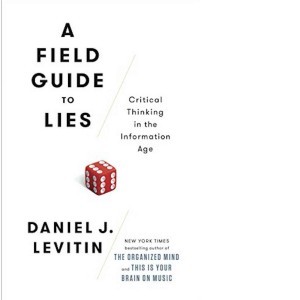In an era defined by unprecedented access to information, the ability to discern truth from falsehood is more crucial than ever. We are constantly bombarded with data, opinions, and claims, making it increasingly difficult to separate fact from fiction. Daniel J. Levitin, in his book A Field Guide to Lies: Critical Thinking in the Information Age, offers a practical framework for evaluating information and identifying misinformation.
 Lies Levitin
Lies Levitin
Deconstructing Numerical Claims
Numbers often present an illusion of objectivity, but Levitin cautions against accepting them at face value. He emphasizes that statistics are human-made constructs, subject to manipulation at every stage, from data collection to analysis and reporting.
Critical thinkers should question the plausibility of statistics by applying basic reasoning skills. This involves understanding different types of averages (mean, median, and mode), evaluating sample composition (avoiding combinations of inappropriate sub-samples or divisions that obscure the truth), and assessing the representativeness of the sample.
Graphical representations of data also require careful scrutiny. Examine how axes are constructed and labeled, paying attention to whether they depict the full range of the data. Be wary of coincidental correlations, the influence of third variables, and the practical significance of observed relationships. Understand the limitations of interpolation (estimating data points within a range) and extrapolation (estimating values beyond a range).
Ultimately, Levitin urges readers to overcome their intimidation of numbers, question their validity, and test their plausibility.
Analyzing Verbal Claims and Expertise
Humans learn through stories and claims, making it vital to critically evaluate the words we encounter. In A Field Guide to Lies, Levitin encourages questioning the expertise of alleged experts. Who determined their expertise, and does their authority extend to the relevant domain? Expertise is relative, and even experts can be wrong or disagree.
Critical consumers should also evaluate the credibility of publications and websites, seeking out evidence of rigorous verification and support for claims. By applying these principles, individuals can become more discerning consumers of information and avoid falling prey to misleading or false narratives.
Understanding Scientific Reasoning and Logical Fallacies
Science offers invaluable methods for understanding the world, but it’s crucial to understand the nuances of scientific reasoning. Levitin explains three primary approaches: deduction (moving from general observations to specific predictions), induction (using facts to explain a general principle), and abduction (constructing a theory to account for observations).
Levitin highlights the importance of recognizing logical fallacies, which can lead to flawed conclusions. He warns of the dangers of assuming correlation implies causation and emphasizes the significance of acknowledging the limits of one’s knowledge. Understanding these principles helps individuals to think more critically about scientific claims and avoid common pitfalls in reasoning.
Practical Application and the Importance of Critical Consumption
Levitin concludes A Field Guide to Lies with real-world examples of how to apply critical thinking skills. He highlights the benefits of living in the information age, acknowledging the incredible access to knowledge we enjoy. However, he argues that this access comes with the responsibility to evaluate information critically. By adopting a skeptical and analytical approach, readers can protect themselves from deception and make more informed decisions in all aspects of their lives.
Levitin’s work emphasizes that critical thinking is not just an academic exercise but a vital skill for navigating the complexities of the modern world.
Reference
Levitin, D. J., author. (2016). A field guide to lies: Critical thinking in the information age. New York, New York: Dutton.
